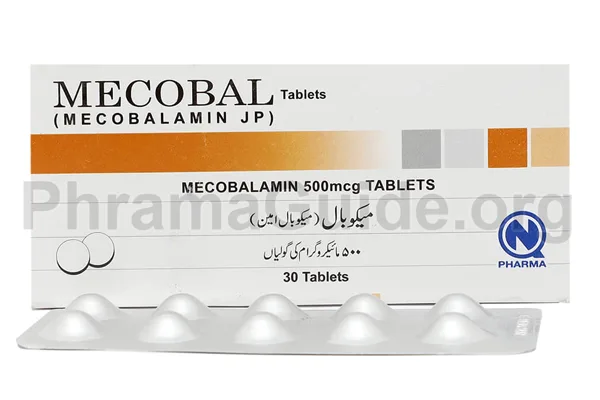Mecoba is commonly used to treat or prevent vitamin B12 deficiency and associated conditions. Like any medication or supplement, Mecobal can have side effects. Common and less common side effects of Mecobal may include:
Common Side Effects
- Nausea: Some individuals may experience mild stomach discomfort or nausea when taking Mecobal.
- Diarrhea: An upset stomach and diarrhea can occur in some cases.
- Injection Site Reactions: When Mecobal is administered as an injection, redness, swelling, or pain at the injection site may occur.
- Skin Reactions: Some individuals may experience mild skin rashes or itching with Mecobal.
Less Common Side Effects
- Allergic Reactions: In rare cases, individuals may have an allergic reaction to Mecobal, which can manifest as hives, itching, swelling of the face or throat, severe dizziness, or difficulty breathing.
- Hypokalemia: Mecobal may lead to decreased levels of potassium in the blood (hypokalemia) in rare instances.
- Heart Palpitations: Some individuals may experience irregular heartbeats or palpitations.
- Chest Pain: Chest pain is a less common side effect of Mecobal, but it should be reported to a healthcare provider.
- Muscle Pain or Weakness: Muscular pain or weakness may occur in rare cases.

What is Mecobal?
Mecobal is one of the leading brands of Mecobalamin, manufactured and marketed by NabiQasim Pharma Pakistan.
Mecobal : Available Formulations and Strengths
Presently, Mecobal is available in Tablet and Injectable Forms
Mecobal Tablets : 500mcg Strength
Mecobal Injections : 500mcg Strength
What Are The Possible Drug Interactions of Mecobal?
- Anticonvulsant Medications: Mecobal may interact with certain anticonvulsant drugs, such as phenytoin, and reduce their effectiveness. This can potentially lead to an increased risk of seizures.
- Colchicine: When used in combination with colchicine, Mecobal may increase the risk of neuropathy. This interaction is relatively rare but can be serious.
- Potassium-Sparing Diuretics: Mecobal may interact with potassium-sparing diuretics, leading to an increased risk of hyperkalemia (high potassium levels in the blood).
- Metformin: Mecobal may interact with metformin, a medication used to manage diabetes, by enhancing its glucose-lowering effects.
- Proton Pump Inhibitors (PPIs): Long-term use of PPIs may reduce the absorption of vitamin B12, including Mecobal. Combining PPIs with Mecobal may help mitigate the risk of vitamin B12 deficiency associated with PPI use.
- Chloramphenicol: Mecobal may decrease the therapeutic effect of chloramphenicol, an antibiotic.
- H2 Blockers: H2 blockers, such as ranitidine and cimetidine, may reduce the absorption of vitamin B12, including Mecobal. Taking them together might decrease the effectiveness of Mecobal.

Leave A Comment